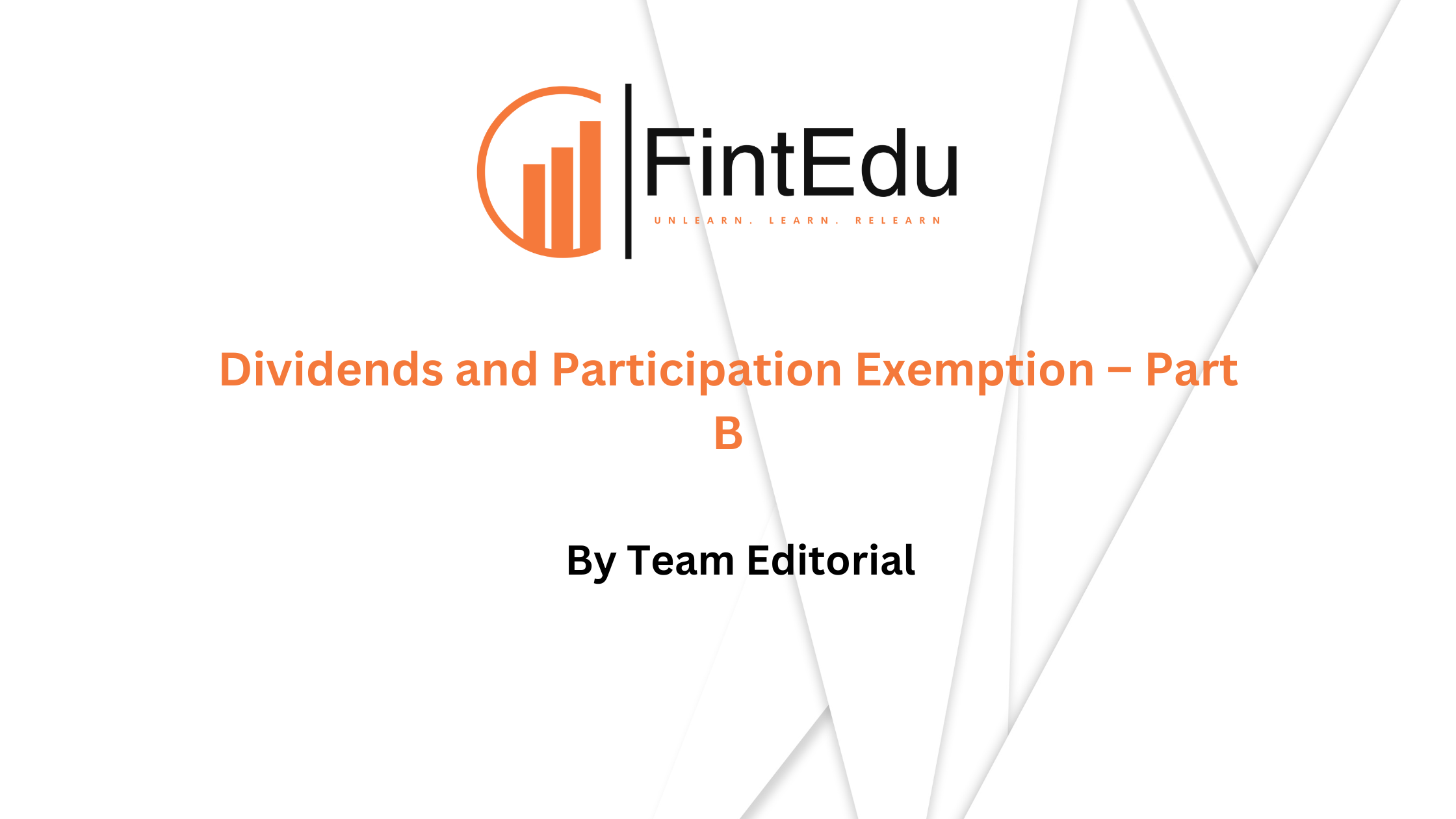LISTEN TO THE ARTICLES
Part A of this series discusses the meaning of dividend and profit distributions by a company along with the manner of taxation. We shall now proceed to discuss the details of the Participation Exemption.
A. Participation Exemption
Certain income received by a Taxable Person from a Participating Interest in a juridical person is exempt from Corporate Tax, also known as the “Participation Exemption”. The exemption is available if the Taxable Person holds Participating Interest in the investee company in terms of investment, voting rights etc.
The Participation Exemption allows for an exemption from Corporate Tax for various income and losses related to Participating Interests, including dividends, gains/losses from transfers, foreign exchange, and impairment gains/losses.
This exemption applies automatically without the need for filing an election with the tax authorities. It can be claimed by both resident and non-resident Taxable Persons, provided the specified conditions are met. Other income that is not directly related to the ownership of a Participating Interest, will not be eligible for Participation Exemption.
In real life scenarios, where income of a non-resident is exempt in the UAE by virtue of Participation Exemption, a challenge may arise for the taxpayer in the country of residence which may deny treaty benefit (tax exemption / tax credit) on such exempt income.
B. Participation Interest
A Participating Interest is a significant ownership interest in a juridical person, indicating control or influence, including:
· Ownership of 5% or more in the entity;
· Minimum acquisition cost threshold (AED 4 million);
· Holding the interest for at least 12 months;
· The entity[1] is subject to Corporate Tax or foreign corporate tax (9% or more); and
· Entitlement to receive at least 5% of profits and liquidation proceeds.
C. Deductibility of expenses
Expenditure related to income exempt under Participation Exemption is non-deductible for corporate tax purposes, as the corresponding income is tax exempt. The general rules on deductibility of expenses are as follows:
· Expenditure having a clear and direct connection with exempt income is not deductible (eg. expenses related to managing, administering a Participating Interest). Expenditure not related to exempt income or with a remote or indirect connection is deductible.
· In cases where a common expense benefits both exempt and taxable income, then (i) expenses wholly and exclusively incurred for deriving taxable income are deductible, (ii) expenses wholly and exclusively incurred for deriving exempt income are non-deductible, and (iii) remaining unidentifiable balance is apportioned between taxable and exempt income fairly and reasonably.
· Expenditure related to the acquisition, sale, transfer, or disposal of a Participating Interest is generally non-deductible, except for interest expenses.
· Interest paid on exempt income, benefiting from the Participation Exemption, is generally deductible. However, there is a limitation on the amount deductible based on General Interest Deduction Limitation Rule.
D. Tax Groups
The Corporate Tax Law allows a "parent company" to form a Tax Group with one or more “subsidiaries” making them collectively a single Taxable Person. Since all members within a Tax Group are considered a single entity for tax purposes, transactions between these members are eliminated when calculating the Taxable Income. For this purpose, the parent company must consolidate the financial results, assets, and liabilities of each subsidiary and prepare consolidated financial statements.
Income from a Participating Interest within the same Tax Group, like dividend income, is disregarded when preparing the consolidated financial statements. Thus, Participation Exemption is not applicable in such cases for dividends or profit distributions within the Tax Group. However, if a member of a Tax Group receives income from a Participating Interest that is not part of the Tax Group, the Participation Exemption may be available.
Disclaimer : The content on this website is provided for general informational purposes only. It is not intended as professional advice and should not be construed as such. The information is based on the knowledge and experience available at the time of writing and is subject to change.
Contributor
Related Posts

@@PLUGINFILE@@/Tax%20Group%20in%20UAE%20%E2%80%93%20Limitation%20on%20Interest%20Deducti...
Read More
@@PLUGINFILE@@/New%20Pension%20Law%20in%20the%20UAE%20and%20Emiratisation.mp3 LISTEN TO T...
Read More
@@PLUGINFILE@@/Saudi%20Arabia%20%E2%80%93%20Tax%20Measures%20to%20Boost%20Investments%20and%20...
Read More